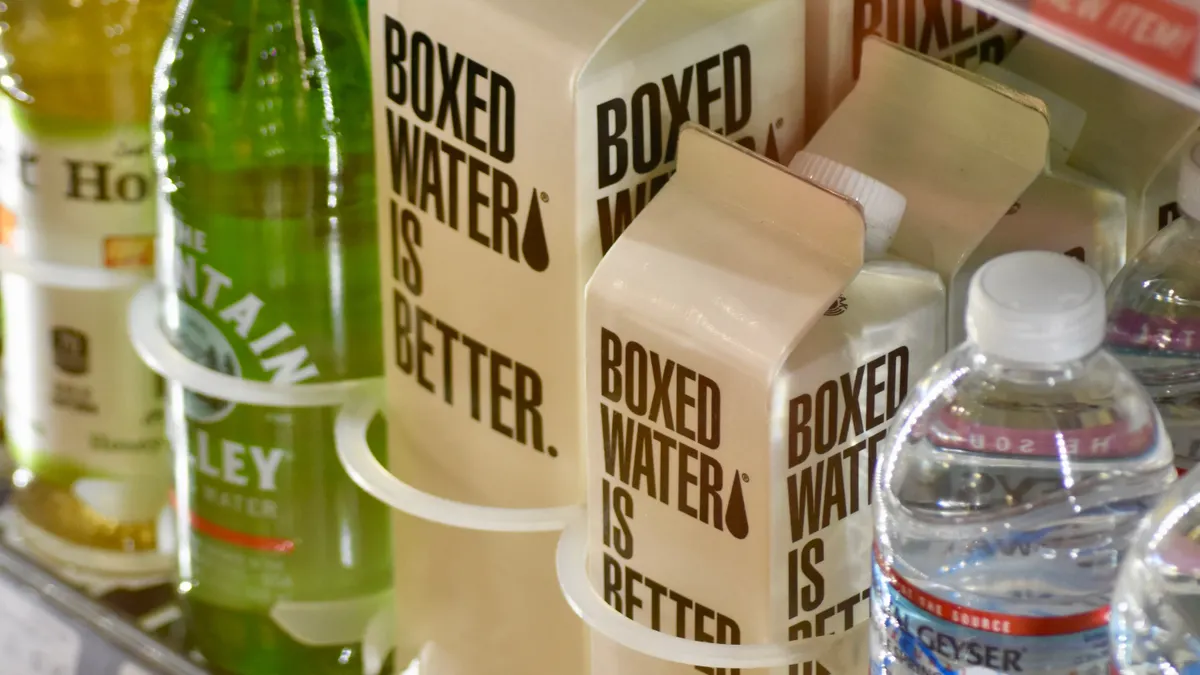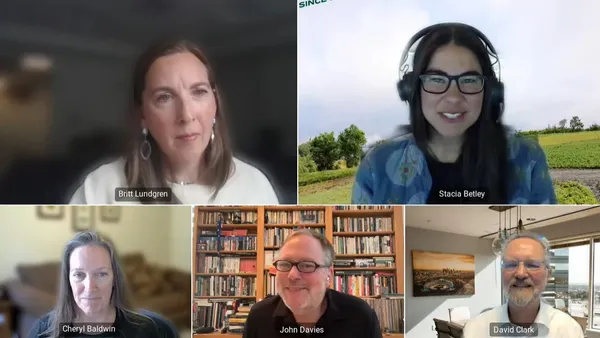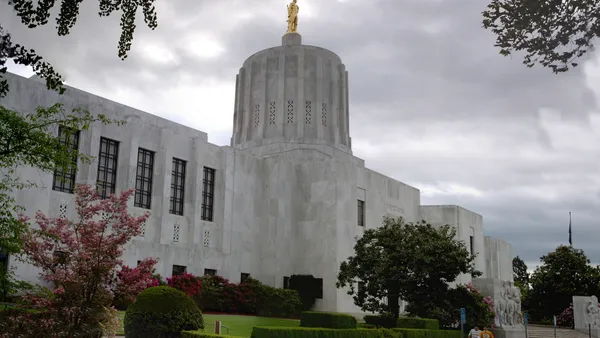Dive Brief:
- The brand Boxed Water is Better, which sells cartons of water, agreed to change certain environmental claims on its packaging in response to a decision by independent nonprofit BBB National Programs’ National Advertising Division. The case was initiated by the International Bottled Water Association.
- NAD recommended that BWIB clarifies or discontinues claims related to renewable materials and sustainable sourcing, but it said claims regarding the cartons’ recyclability or general sustainability are OK.
- "We are very pleased that the NAD ruled that an overwhelming number of our claims are backed by science and reliably substantiated,” said Boxed Water is Better CEO Daryn Kuipers in an emailed statement.
Dive Insight:
PET bottles still dominate the individual non-carbonated water product space, accounting for more than 80% of revenue share last year, according to Grand View Research. But use of metal- and fiber-based containers is growing. In addition to Boxed Water is Better, notable players that sell water in cartons include Just Water and Flow Beverage.
Boxed Water is Better launched in 2009, and its marketing strategy largely has centered on providing an alternative to water sold in single-use plastic bottles. The company backs up some of its environmental claims with a life cycle assessment, which it says illustrates how its cartons are a more sustainable packaging choice than plastic bottles or aluminum cans.
That LCA came up in NAD’s investigation of whether the company had engaged in deceptive advertising or puffery. The nonprofit determined the LCA does back up certain comparative environmental impact claims, including “Boxed Water is better than aluminum.”
However, BWIB agreed to change certain statements to clarify the comparison to “premium” plastic bottles. These statements include “Boxed Water is Better,” “Boxed Water is better than plastic,” and “Compared to single-use plastic bottles and canned water, our plant-based cartons have a lower environmental impact throughout their lifecycle.”
In total, NAD reviewed more than 50 implicit and explicit claims in a case initiated by the International Bottled Water Association, whose members include bottlers and packaging suppliers such as Plastipak. IBWA said in an emailed response that it is pleased with the company’s voluntary modifications, but it has requested an appeal of others and “will reserve further comment pending issuance of a final decision.”
NAD decided some of BWIB’s statements can remain as-is, including:
- Cartons are “recyclable” or “100% recyclable.” Boxed Water is Better adequately showed that each of its cartons only contains three materials — fiber, aluminum and plant-based plastic — and all of these can be recycled. “It was undisputed that 100% of the Boxed Water carton is able to be recycled, provided the facility separates the layers and has the capacity,” NAD said.
- BWIB has planted 1.5 million trees. NAD found BWIB sufficiently supported its claims about the number of trees planted.
- General environmental benefit and sustainability claims are acceptable. Claims such as “The earth loves our box,” “Better for the Planet,” and “Sustainable” do not require additional qualifications. However, NAB suggested that BWIB better explains its “Sustainably sourced” statement.
Besides changing claims related to the life cycle assessment, NAD also recommended that BWIB modify or eliminate certain messaging it says isn’t adequately supported or could be misinterpreted by consumers:
- Cartons are made from renewable materials. BWIB’s claims of a “92% plant-based carton” and “our carton is made from 92% renewable materials” are based on a mass balance approach that shows the carton’s liner film and cap are 100% plant-based plastic, NAD said. However, the average consumer likely doesn’t know about or understand mass balance methods used for tracking material sources and calculating material contents, so NAD suggested modifications to clarify. It also suggested modifying the unqualified claim, “Explore our renewable packaged option,” and getting rid of the claim, “For those times when reusable bottles aren’t an option, our paper-based cartons are the most renewable option in the water aisle.”
- Cartons are made with 100% plant-based materials and are biodegradable. BWIB’s advertising “did not reasonably convey” this messaging, NAB concluded.
The International Bottled Water Association applauded several of NAB’s determinations, including the suggestions for “discontinuing all comparative percentage environmental claims and agreeing to make it clear that all of Boxed Water’s environmental impact comparisons to bottled water based on its 2019 Life Cycle Analysis study are to heavier plastic bottles that [weigh] more than the national average,” according to the emailed statement.
However, the group launched an appeal for other challenges it initially raised that NAB deemed acceptable. It requested an examination by the National Advertising Review Board, the appellate-level truth-in-advertising body of BBB National Programs.
Partner Gonzalo Mon and Special Counsel Katie Rogers at law firm Kelley Drye penned blog posts regarding the Boxed Water is Better case. In one post, they tackled the issue of mass balance to substantiate environmental claims.
“Although the total amount of renewable plastic purchased by the BWIB accounts for 100% of its caps and liners, a given cap or liner in a BWIB carton will contain an indeterminant amount of plant-based plastic. As a practical matter, this means that any given carton may contain anywhere between 66% to 96% renewable material,” said Mon and Rogers.
“NAD found that although the FTC’s Green Guides are silent on mass balance accounting, they do suggest that ‘in some circumstances, it may be permissible to claim that a product has a certain amount of material even if any particular product does not physically contain that much,’” they continued.
NAD also acknowledged that some parties have submitted comments encouraging the Federal Trade Commisison to address mass balance in its ongoing work to update the Green Guides, the agency’s guidelines for environmental marketing claims, the attorneys pointed out. The U.S. EPA previously submitted some comments on this, including that the Green Guides should not “promote the mass balance approach as it is not widely implemented or accepted worldwide.”
The Kelley Drye attorneys also further explained NAD’s decisions on other marketing, such as the “better” claims. While specific comparative statements need to be substantiated, the standalone “Boxed Water is Better” brand name on the carton “is puffery and does not require substantiation,” according to NAD.
While observers await NARB’s decision from the appeal, this case “should serve as a reminder that green claims often face scrutiny from competitors, as well as class action attorneys,” said the Kelley Drye attorneys. “If you haven’t taken a close look at your green claims to ensure they’re properly qualified and substantiated, now may be a good time to do that.”
Boxed Water was bought by Nyrad LLC, a group of private investors, in February.











